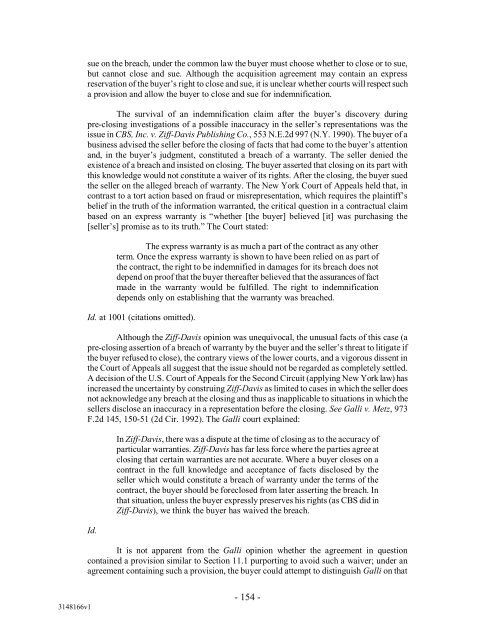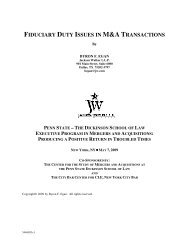- Page 1 and 2:
ASSET ACQUISITIONS: A ROADMAP TO GE
- Page 3 and 4:
VIII. SELECTED ASSET PURCHASE AGREE
- Page 5 and 6:
(B) Introductory matters concerning
- Page 7 and 8:
on the deemed asset sale, since the
- Page 9 and 10:
administrative delays in addition t
- Page 11 and 12:
extended coverage for preclosing oc
- Page 13 and 14:
IV.SUCCESSOR LIABILITYA. Background
- Page 15 and 16:
much like a merger. The theory was
- Page 17 and 18:
essentially the same ingredients wh
- Page 19 and 20:
2. Structure of TransactionIf a tra
- Page 21 and 22:
indemnification. A portion of the p
- Page 23 and 24:
differing interests in the transact
- Page 25 and 26:
C. Gap Between Signing and ClosingO
- Page 27 and 28:
11.6 LIMITATIONS ON AMOUNT - BUYER.
- Page 29 and 30:
AgreementThe parties, intending to
- Page 31 and 32:
“Breach” -- any breach of, or a
- Page 33 and 34:
use, voting (in the case of any sec
- Page 35 and 36:
“Ground Lease” -- any long-term
- Page 37 and 38:
“Order” -- any order, injunctio
- Page 39 and 40:
“Part” -- a part or section of
- Page 41 and 42:
“Seller Contact” -- as defined
- Page 43 and 44:
COMMENTClauses (v), (vii), (viii) a
- Page 45 and 46:
parties should always pay close att
- Page 47 and 48:
consulting services to customers as
- Page 49 and 50:
diligence analysis (which typically
- Page 51 and 52:
Course of Business prior to the Eff
- Page 53 and 54:
uyer to negotiate the indemnificati
- Page 55 and 56:
2.5 ALLOCATIONThe Purchase Price sh
- Page 57 and 58:
satisfaction of some conditions may
- Page 59 and 60:
(iii) the Escrow Agreement, execute
- Page 61 and 62:
Once a certified check has been cer
- Page 63 and 64:
espect to the Real Property and Tan
- Page 65 and 66:
work papers and other documents and
- Page 67 and 68:
expressly provide for arbitration i
- Page 69 and 70:
Closing, the parties shall use Best
- Page 71 and 72:
Alternatively, the Buyer can elect
- Page 73 and 74:
1980s and the Year 2000 representat
- Page 75 and 76:
(b) Except as set forth in Part 3.2
- Page 77 and 78:
clause (iv) of Section 3.2(b), the
- Page 79 and 80:
4. recorded agreements or declarati
- Page 81 and 82:
audit committee thereof during the
- Page 83 and 84:
166 (1991). The buyer is unlikely t
- Page 85 and 86:
the happening of which may bring in
- Page 87 and 88:
(iii) Consolidated Group. Seller (A
- Page 89 and 90:
Certain provisions of Section 3.14
- Page 91 and 92:
the circumstances described above,
- Page 93 and 94:
was some variation from agreement t
- Page 95 and 96:
declared) occurring after the date
- Page 97 and 98:
and entering into a commercial deal
- Page 99 and 100:
3.25 INTELLECTUAL PROPERTY ASSETS(a
- Page 101 and 102:
(ii) All of the registered Copyrigh
- Page 103 and 104:
Section 3.25(d) requires disclosure
- Page 105 and 106: the seller has many unregistered tr
- Page 107 and 108: Copyrights: 17 U.S.C. §102(a) prov
- Page 109 and 110: The buyer should also investigate a
- Page 111 and 112: forced to dispose of the assets or
- Page 113 and 114: supplement to the Disclosure Letter
- Page 115 and 116: Property and Tangible Personal Prop
- Page 117 and 118: The seller may want the contract to
- Page 119 and 120: only a right to be conferred with,
- Page 121 and 122: (including, for example, lenders) t
- Page 123 and 124: Section 5.6 is not qualified by a
- Page 125 and 126: offices, and the assets to be trans
- Page 127 and 128: The last significant change in Revi
- Page 129 and 130: Materiality Qualification in Sectio
- Page 131 and 132: “brought down” to the Closing D
- Page 133 and 134: materially inaccurate as of the clo
- Page 135 and 136: indebtedness represented by such no
- Page 137 and 138: Section 7.5 relates only to litigat
- Page 139 and 140: A seller may take the position that
- Page 141 and 142: Buyer shall have obtained on terms
- Page 143 and 144: and (d) have no materiality test. T
- Page 145 and 146: the part of the seller. In lieu of
- Page 147 and 148: enefits and salary and wage structu
- Page 149 and 150: to the sale of any property to the
- Page 151 and 152: prohibits the Buyer from making any
- Page 153 and 154: for stock ownership in a public com
- Page 155: investigation or assessment) conduc
- Page 159 and 160: should be limited to situations in
- Page 161 and 162: eaches of noncompetition agreements
- Page 163 and 164: third party claims); Edward E. Gill
- Page 165 and 166: allegedly arising from any Hazardou
- Page 167 and 168: process or are to be anticipated fr
- Page 169 and 170: If Buyer would have a claim for ind
- Page 171 and 172: attorneys request that representati
- Page 173 and 174: can, as a practical matter, withhol
- Page 175 and 176: (c) Notwithstanding the foregoing,
- Page 177 and 178: Environmental indemnification often
- Page 179 and 180: North Dakota, and Delaware require
- Page 181 and 182: Because Article 12 assumes that a c
- Page 183 and 184: Section 12.2(a) follows the same ge
- Page 185 and 186: The Disclosing Party is not waiving
- Page 187 and 188: Although the attorney-client privil
- Page 189 and 190: changes hands, whether the attorney
- Page 191 and 192: “Delaware courts have not hesitat
- Page 193 and 194: In deciding whether a jury waiver c
- Page 195 and 196: factors, particularly concern over
- Page 197 and 198: parties shall share equally the fee
- Page 199 and 200: compensated in all cases by monetar
- Page 201 and 202: incorporated into) the terms of the
- Page 203 and 204: (1) The law of the state chosen by
- Page 205 and 206: disputes arising out of that contra
- Page 207 and 208:
1989). In Acushnet River, the Unite
- Page 209 and 210:
The Court then set forth the factor
- Page 211 and 212:
Citizens held itself out to the wor
- Page 213 and 214:
Appendix BEXCERPTS FROM BYRON F. EG
- Page 215 and 216:
corporation’s assets is not liabl
- Page 217 and 218:
the injured party, and who can best
- Page 219 and 220:
Over time, some courts have used le
- Page 221 and 222:
5. retention of the same name;6. co
- Page 223 and 224:
where strict tort liability for def
- Page 225 and 226:
In Knapp, 55 in addition to the de
- Page 227 and 228:
3. Labor, Employment & Benefits Cas
- Page 229 and 230:
5. Contract CasesIn certain instanc
- Page 231 and 232:
4. Choice of LawIn transactions whe
- Page 233 and 234:
Appendix DACQUISITION OF A DIVISION
- Page 235 and 236:
schedule of payables at the date of
- Page 237 and 238:
2. Even if buyer’s counsel is com
- Page 239 and 240:
name which is material to the value
- Page 241 and 242:
EXAMPLE 1SAMPLE DESCRIPTION OF ASSE
- Page 243 and 244:
INTRODUCTION TO TRANSITIONAL SERVIC
- Page 245 and 246:
1.3 “Fully Allocated Cost” shal
- Page 247 and 248:
5. Force Majeure5.1 Seller shall no
- Page 249 and 250:
To Buyer:■12. Entire Agreement12.
- Page 251 and 252:
SCHEDULE 1.2FIXED PRICE SERVICES PR
- Page 253 and 254:
SCHEDULE 1.4HR SERVICESHR Services
- Page 255 and 256:
Appendix EHypothetical Scenarios1.I
- Page 257 and 258:
— Section 3.29 (no Shareholder ow
- Page 259 and 260:
Note that, if Buyer elects to exerc
- Page 261 and 262:
damages as a result of the Blocking
- Page 263 and 264:
down” certificate expressly state
- Page 265 and 266:
The failure to disclose the Blockin
- Page 267 and 268:
• Seller received no threat of li
- Page 269 and 270:
2. If Buyer proceeds with the asset
- Page 271 and 272:
neither strategically significant n
- Page 273 and 274:
to the closing date, and Seller wil
- Page 275 and 276:
11.2(a) and (f)) Seller may attempt
- Page 277 and 278:
pursuant to Section 2.7(a)(ix) expr
- Page 279 and 280:
Parent, Parent shall take all such
- Page 281 and 282:
(b) The Company shall give prompt n
- Page 283 and 284:
stockholders ratified the merger ag
- Page 285 and 286:
available to us or our Representati
- Page 287 and 288:
Section 5.08. Financial Statements.
- Page 289 and 290:
capital contributions to or investm
- Page 291 and 292:
The Disclosure Schedule further sta
- Page 293 and 294:
construed in light of such disclosu
- Page 295 and 296:
and (ii) did not contain any untrue
- Page 297 and 298:
the Mergers shall be subject to the
- Page 299 and 300:
discount. Enron claims that the onl
- Page 301 and 302:
that the primary agencies who assig
- Page 303 and 304:
Appendix JIN THE UNITED STATES COUR
- Page 305 and 306:
Fina shall indemnify, defend and ho
- Page 307 and 308:
. Application of Delaware lawFina h
- Page 309 and 310:
provision was signed can the courts
- Page 311 and 312:
The sophistication of the contracti
















